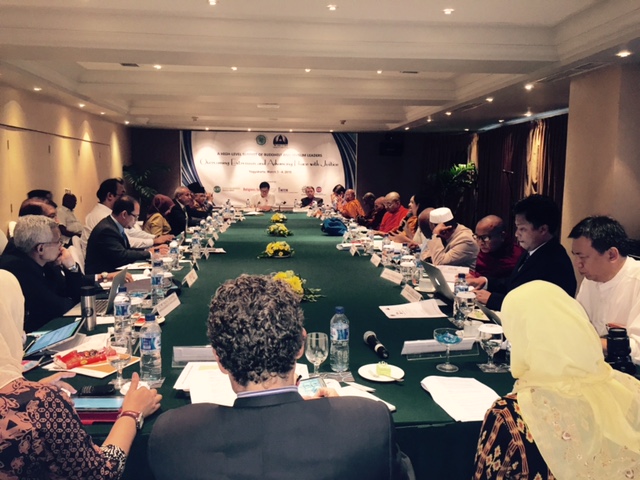Buddhist radicalism is on the rise in countries like Myanmar and Sri Lanka. Since 2012, both countries have witnessed severe violence against their Muslim minorities. Attacks take place in an atmosphere of strong anti-Muslim rhetoric put forward by certain monk-led nationalist groups, and the (largely unknown) orchestrators and perpetrators of these attacks operate with impunity.
What we are witnessing now is a new form of Buddhist revivalism similar to those seen in both countries during their colonial and early independence periods. But in the sense that Buddhist radical groups in Myanmar and Sri Lanka see their own challenges not only from a local point of view, but also understand it within regional—even global—frameworks, this new Buddhist radicalism is transnational.
Sharing with its prior manifestations a concern for state protection of Buddhism, this political Buddhism resists what it understands to be “the Islamic threat,” particularly the global spread, noticeably into Asia, of conservative expressions of Islam and forms of Muslim violent extremism. In the current situation, we have seen stronger attachments to Buddhist identity vis-à-vis other religions, as well as a new regional concern about religious minorities and majorities in Asia.
There is a broad Buddhist political consciousness at play, and a greater sense of local connection to a wider Buddhist sangha, at least in the Theravada world. The same sense of broader connectivity and transnationalism that characterizes this new Buddhist revivalism (and its attendant anti-Muslim rhetoric) has also fueled many religious peace initiatives across the region, undertaken by both Muslims and Buddhists.
In March, nearly 30 practitioners and academics working across Theravada contexts met at Chulalongkorn University in Bangkok, Thailand, to discuss various strategies for religious peacebuilding. The increasing frequency of hate speech by religious leaders, violent confrontation between religious communities, and new forms of religious intolerance in social and legal norms have been met with great concern, not only by Western states, the UN, and international nongovernmental organizations like Human Rights Watch or Amnesty International, but more importantly, by local and regional civil society organizations and religious leaders. Although international engagement has its place, such discussions on issues like inter-communal violence, the place of religion in the public sphere, and legitimate or illegitimate restrictions on freedom of religion or belief must be addressed within the religious communities themselves.
Through a shared interest for the common good, religious peace initiatives might offer alternative spaces for cooperation between communities. Many of the initiatives discussed at the Bangkok meeting, for example, addressed the best ways for improving health care, education, and access to resources for all.
In the case of both Myanmar and Sri Lanka, what is at stake according to radical Buddhists is the very survival of Buddhism in the face of the “Islamic threat.” The question, then, is how to protect Buddhism in a way that does not violate the rights of non-Buddhists or foster communal conflict. This requires an intra-Buddhist debate on Buddhist principles, religious pluralism, and human rights.
So far, the most important top-level initiative in the region has been the Yogyakarta meeting in Indonesia. In March 2015, religious officials from across the region met to discuss Buddhist-Muslim relations and to foster mutual peace and understanding. Their declaration states, “Buddhism and Islam have been misused by some for their own political purposes to fuel prejudice and stereotyping and to incite discrimination and violence.” They pledged continued work to promote inter- and intra-religious education, conflict prevention, and positive engagement with the media.
Statements like this, crafted by local religious leaders and endorsed by authoritative Buddhist and Muslim organizations, carry far more weight than any human rights group’s condemnation of the role of religious leaders in creating intolerance and mistrust.
Often romanticized and promoted by religious peacebuilders themselves, religious peacebuilding remains a vague notion. There are many pitfalls to be recognized: the limited influence of religious leaders upon their communities, their lack of independence from the state, and the danger of top-level talk with little impact on local social and political realities. However, amid rising levels of religious tension, religious players will need to act, lest exclusivist ideologies, intolerance, and violence are to win.
A version of this essay was originally published on PRIO’s blog.
Thank you for subscribing to Tricycle! As a nonprofit, we depend on readers like you to keep Buddhist teachings and practices widely available.
